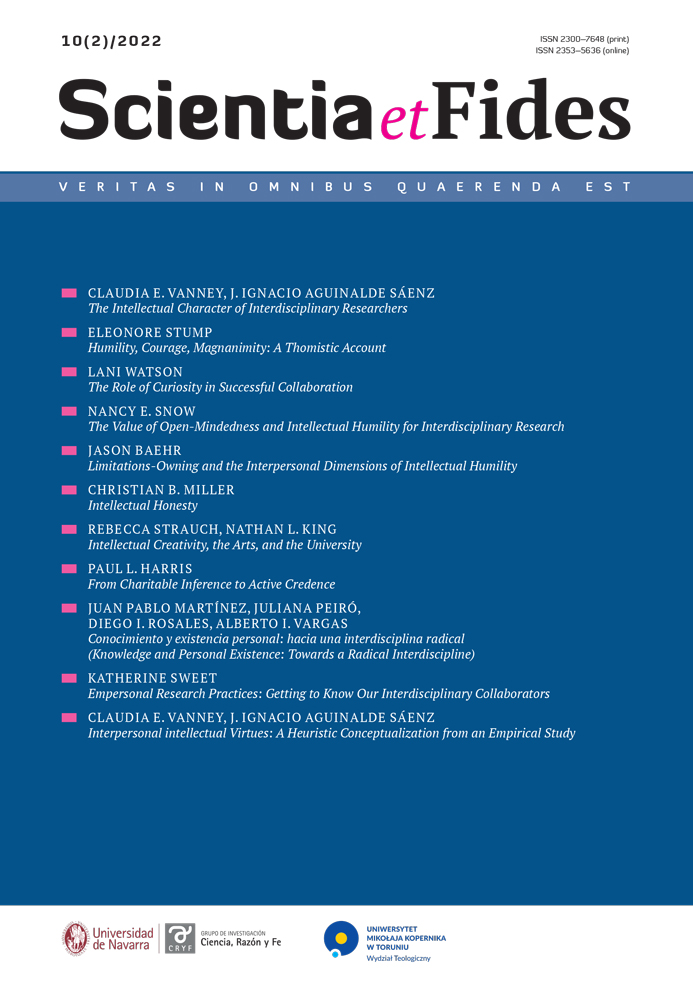Empersonal Research Practices
Getting to Know Our Interdisciplinary Collaborators
DOI:
https://doi.org/10.12775/SetF.2022.024Keywords
inquiry, knowledge of persons, collaboration, shared inquiry, intellectual virtueAbstract
Collaborative research is quite common in contemporary society; indeed, it may be thought that scientists cannot live without it. Yet, it seems difficult to engage in good interdisciplinary collaboration when research methods and background assumptions often differ widely. I suggest in this paper that a disposition to inquire into another person is essential to good collaborative research. I first explain what I mean by “empersonal inquisitiveness” and why it is important in interdisciplinary collaboration. Inquiring into a person serves as an important precursor to engaging in interdisciplinary collaboration, because it allows researchers to form shared frameworks and develop a shared plan for the research project. I then discuss social-cognitive mechanisms and their ability to generate knowledge of other persons. In the final section of the paper, I explain how social cognition can allow persons to engage in truly collaborative projects, in particular by way of shared mental models and shared reasoning. The result is that empersonal inquisitiveness, when employed by potential research partners, produces important empersonal knowledge that advances collaborative research.
References
Byrne, Ruth M.J. 2005. The Rational Imagination: How People Create Alternatives to Reality. Cambridge, MA: MIT Press.
De Backer, Liesje, Hilde Van Keer, and Martin Valcke. 2022. “The Functions of Shared Metacognitive Regulation and their Differential Relation with Collaborative Learners’ Understanding of the Learning Content.” Learning and Instruction 77: 101527. https://doi.org/10.1016/j.learninstruc.2021.101527.
De Jaegher, Hanne, and Ezequiel Di Paolo. 2007. “Participatory Sense-Making: An Enactive Approach to Social Cognition.” Phenomenology and the Cognitive Sciences 6, no 4: 485–507.
Goldman, Alvin. 2013. Joint Ventures: Mindreading, Mirroring, and Embodied Cognition. New York: Oxford University Press.
Grant, Adam M., and James W. Berry. 2011. “The Necessity of Others is the Mother of Invention: Intrinsic and Prosocial Motivations, Perspective Taking, and Creativity.” The Academy of Management Journal 54, no 1: 73–96.
Hoever, Inga J., Daan van Knippenberg, Wendy P. van Ginkel, and Harry G Barkema. 2012. “Fostering Team Creativity: Perspective Taking as Key to Unlocking Diversity’s Potential.” Journal of Applied Psychology 97, no 5: 982–996.
Johnson-Laird, Philip N. 2006. How We Reason. New York: Oxford University Press.
Johnson-Laird, Philip N., and Ruth M.J. Byrne. 1991. Deduction. Hillsdale, NJ: Lawrence Erlbaum Associates.
Jonker, Catholijn, M. Birna van Riemsdijk, and Bas Vermeulen. 2011. “Shared Mental Models: A Conceptual Analysis.” In Coordination, Organizations, Institutions, and Norms in Agent Systems VI. COIN 2010. Lecture Notes in Computer Science, vol 6541, edited by Marina Vos, Nicoletta Fornara, Jeremy V. Pitt, and George Vouros, 132–151. Berlin: Springer. https://doi.org/10.1007/978-3-642-21268-0_8.
Kotsonis, Alkis. 2021. “Epistemic Collaborativeness as an Intellectual Virtue.” Erkenntnis. https://doi.org/10.1007/s10670-021-00384-y.
Paletz, Susannah B.F., and Christian D. Schunn. 2010. “A Social-Cognitive Framework of Multidisciplinary Team Innovation.” Topics in Cognitive Science 2: 73–95.
Salmon, Merrilee H., and Colleen M. Zeitz. 1995. “Analyzing Conversational Reasoning.” Informal Logic 17, no 1: 1–23.
Spaulding, Shannon. 2018. How We Understand Others: Philosophy and Social Cognition. New York: Routledge.
Suthers, Daniel D. 2003. “Representational Guidance for Collaborative Inquiry.” In Arguing to Learn: Confronting Cognitions in Computer-Supported Collaborative Learning Environments, edited by Jerry Andriessen, Michael Baker, and Dan Suthers, 27–46. Norwell, MA: Kluwer Academic Publishers.
Downloads
Published
How to Cite
Issue
Section
License
Copyright (c) 2022 Katherine Sweet

This work is licensed under a Creative Commons Attribution-NoDerivatives 4.0 International License.
CC BY ND 4.0. The Creator/Contributor is the Licensor, who grants the Licensee a non-exclusive license to use the Work on the fields indicated in the License Agreement.
- The Licensor grants the Licensee a non-exclusive license to use the Work/related rights item specified in § 1 within the following fields: a) recording of Work/related rights item; b) reproduction (multiplication) of Work/related rights item in print and digital technology (e-book, audiobook); c) placing the copies of the multiplied Work/related rights item on the market; d) entering the Work/related rights item to computer memory; e) distribution of the work in electronic version in the open access form on the basis of Creative Commons license (CC BY-ND 3.0) via the digital platform of the Nicolaus Copernicus University Press and file repository of the Nicolaus Copernicus University.
- Usage of the recorded Work by the Licensee within the above fields is not restricted by time, numbers or territory.
- The Licensor grants the license for the Work/related rights item to the Licensee free of charge and for an unspecified period of time.
FULL TEXT License Agreement
Stats
Number of views and downloads: 698
Number of citations: 0



